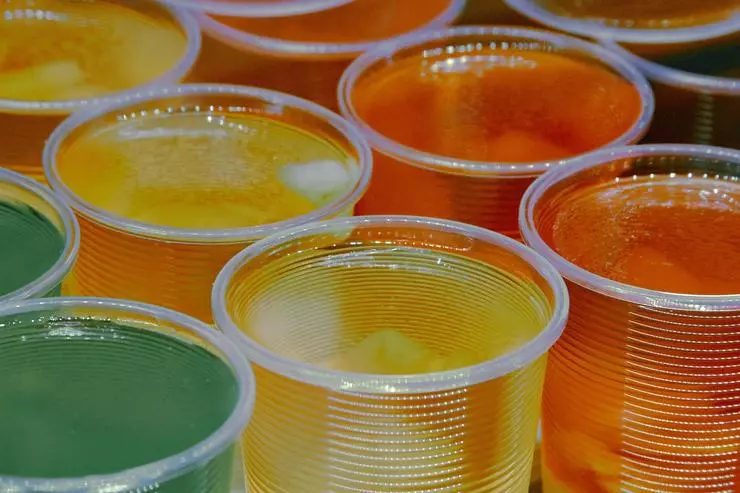Collagen is the most common protein in your body, and gelatin is a cooked form of collagen. Thus, they have several common characteristics and advantages. However, their use and application differ significantly. Therefore, they cannot be used as interchangeable, and you may have to choose one of them depending on your needs. This article discusses the main differences and similarities of collagen and gelatin to help you decide what to choose.
As the most common protein in your body, collagen is about 30% of the mass of your protein. It is mainly contained in connecting tissues, such as leather, joints, bones and teeth, and provides structure, strength and stability to your body. On the other hand, gelatin is a protein product created by partial decomposition of collagen using heat - for example, by boiling or making skin or animal bones.

Gelatin gel-like, collagen - stable
Photo: unsplash.com.
Similarities of these types of protein
Both collagen and gelatin contain almost 100% protein and provide almost the same amount of this nutrient on a portion. They also have similar composition of amino acids, which are organic compounds known as protein building blocks, and glycine is the most common type.
On the other hand, they may differ slightly depending on the animal origin and the method used to extract gelatin. In addition, some commercial products from gelatin contain added sugar, artificial dyes and flavors that can significantly affect the power profile.
Collagen and gelatin are widely used in the cosmetic and pharmaceutical industry, mainly due to their beneficial effects on the skin and health of the joints. They can improve the signs of skin aging, such as dryness, peeling and loss of elasticity as a result of reducing the content of collagen in your skin. Studies show that the consumption of collagen and collagen peptides - degraded collagen form - can increase the production of collagen in the skin and provide anti-aging effect. For example, two studies in people in which the participants took 10 grams of oral collagen additive daily, showed an improvement in skin humidity by 28% and the decrease in collagen fragmentation by 31% is the indicator of the quality loss of collagen - after 8 and 12 weeks, respectively. Similarly, in a 12-month study on animals, the gelatin obtained from fish has improved the thickness of the skin by 18% and the collagen density by 22%.
Moreover, studies show that collagen can increase the level of hyaluronic acid, which is another important component of the skin structure, which indicates a potential positive effect of skin damage caused by ultraviolet B. Finally, a 6-month study involving 105 women has shown that The daily dose of 2.5 grams of collagen peptides significantly improves the appearance of the skin by reducing cellulite, although additional research is needed to confirm this effect.
Can improve joint health
Additives collagen and gelatin can help in the treatment of joint wear, caused by physical exercises, and osteoarthritis, degenerative diseases of the joints, which can cause pain and disability. Studies show that these proteins can improve the health of the joints, accumulating in cartilage after meals, thereby reducing pain and rigidity. For example, in a 70-day study with 80 people with Osteoarthritis, those who took 2 grams of gelatin additives per day have experienced a significant decrease in pain and physical activity compared to those in the control group. Similarly, in a 24-week study with the participation of 94 athletes, those who daily accepted a 10-gram additive collagen showed a significant reduction in pain in the joints, mobility and inflammation compared to those in the control group.

Protein makes cells elastic
Photo: unsplash.com.
Other potential advantages
Collagen and gelatin have a few more general health benefits, including:
Antioxidant activity. And collagen, and gelatin possess antioxidant abilities and struggle with negative effects that free radicals can have aging and general health.
Improving bowel health. Collagen and gelatin can improve the intestinal mucous membrane. Otherwise, damage to the intestinal mucous membrane can lead to a leaky intestinal syndrome and other autoimmune states.
Improving bone health. Adding degraded collagen, such as gelatin, can increase the mineral density of bone tissue and the formation of bone tissue, while reducing the degradation of bones.
Main differences
Most of the differences in collagen and gelatin are associated with their chemical structure. In its natural form, collagen is formed by a triple spiral consisting of 3 chains, each of which contains more than 1000 amino acids. On the contrary, as a degraded form of collagen, gelatin has been subjected to partial hydrolysis or destruction, which means that it consists of shorter amino acid chains. This makes it easier to digest the gelatin in comparison with collagen.
However, collagen additives mainly consist of a fully hydrolyzed form of collagen, called collagen peptides, and they are easier to digest than gelatin. Also, collagen peptides are dissolved both in hot and cold water. On the contrary, gelatin dissolves only in hot water. On the other hand, gelatin can form a gel that is thick with cooling due to its gel-forming properties, the properties that the collagen peptides are missing. That is why they cannot be used interchangeably.
Which to choose?
You can find additives with collagen and gelatin both in powder and granulated form. Additionally, gelatin is sold in a sheet form. Collagen and gelatin, taken orally, have high bioavailability, which means that they are effectively absorbed by your digestive system. Consequently, the choice between collagen or gelatin ultimately depends on their destination.
Collagen is mainly used as an easily digestible food additive. You can add it to coffee or tea, mix with a cocktail or mix with soups and sauces without changing their consistency. On the contrary, gelatin is preferable due to its gelling properties that find many applications in cooking. For example, you can use it for cooking homemade jelly and marmalands or for thickening sauces and refueling. However, you can get the maximum benefit by sticking to collagen additives. This is mainly due to the labels of collagen additives indicate how much you accept, which makes it easy to increase consumption, whereas you potentially can consume much less gelatin if you only use this form in the recipe.
